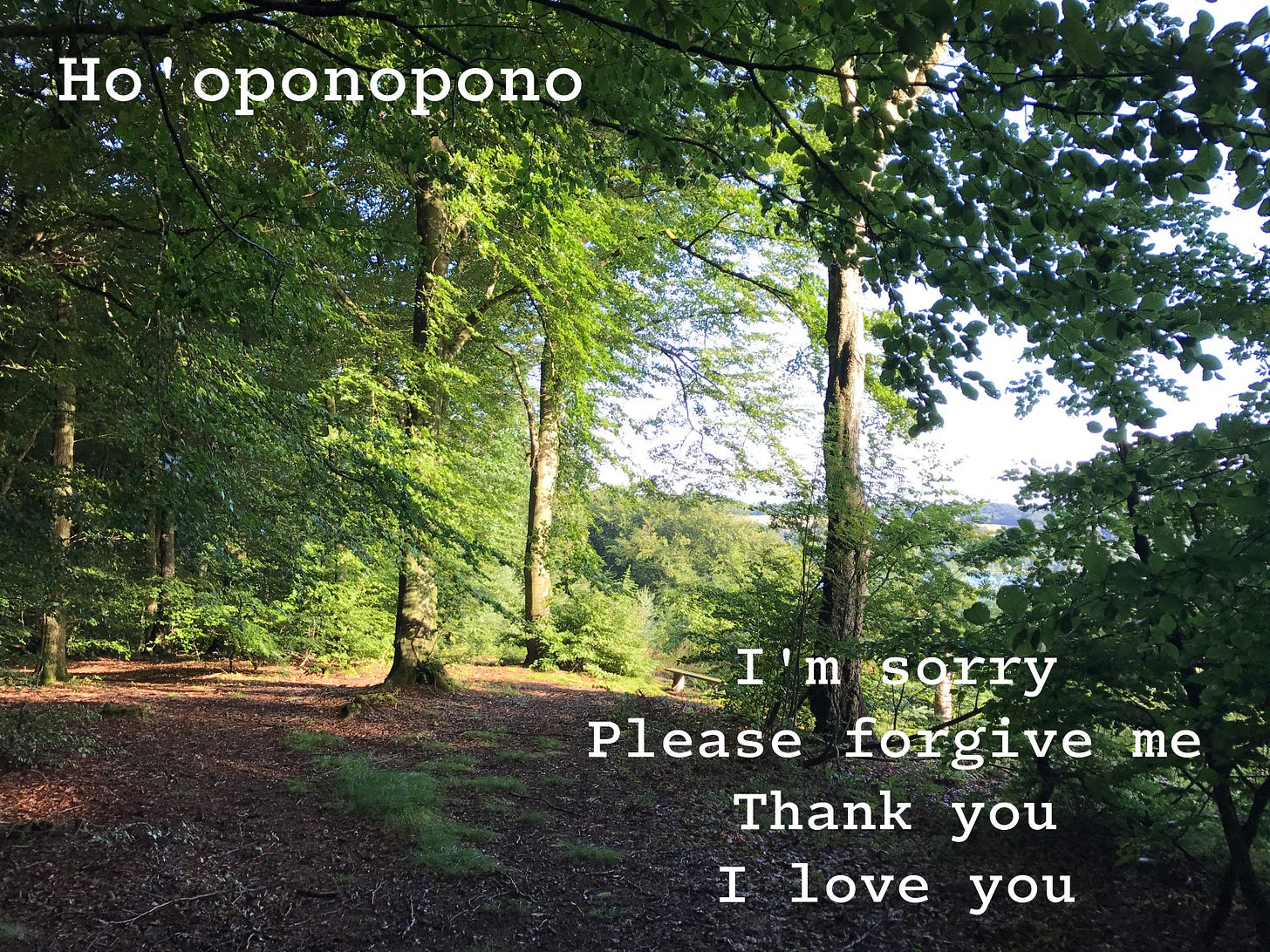Unchained: The Path of Radical Self-Forgiveness
Unlock profound inner freedom through radical self-forgiveness. Releasing the shackles of shame and embracing compassion for your whole self - including past wounds - is the ultimate path to freedom.
This entry is part of a series on “The Hero’s Journey from Trauma to Freedom”: Prologue: The Intentional Invitation. 1. Overcoming Past Patterns. 2. Meeting the Catalyst. 3. Crossing into the Unknown. 4. Rediscovering the Inner Landscape. 5. Meeting the Inner Child. 6. Facing the Shadows. 7. Radical Self-Acceptance. 8. Forgiveness….
In the fable "The Enchanted Bargain," we follow a hero named Gabriel, a gentle and kind deer, who makes a desperate deal to escape a painful situation. Bound by invisible chains of seeking approval from others, especially his cunning friend Elara, Gabriel's journey to freedom begins not with confronting those who wronged him, but by learning to forgive himself. The moral of the fable teaches us that true strength lies in understanding and respecting oneself. Forgiveness starts within. By understanding our earlier wounds, we can break free from the patterns and behaviors that hold us back. This realization — that we were doing the best we knew how at the time — opens the door to seeing others in the same light. Through this, we can experience instant growth and an expanded consciousness.
A Personal Journey
Speaking of holding back parts of who you truly are — You know that feeling when you bare your soul, share those deep, personal wounds with others? Terrifying, right? But also incredibly liberating. That's what writing these steps for healing trauma has been like for me so far. Every time I hit publish, putting my vulnerability on display, my heart races with doubt. "Should I really share this?" But then a feeling of freedom runs through me as I open up to a world that has often felt so uncertain and unsafe.
In the back of my mind, I can't help but wonder if this could all become a book one day. That thought both exhilarates and terrifies me in equal measure. Who would have thought three months ago when I started sharing these vulnerable pieces from scratch, that I'd have nearly 500 kindred spirits joining me on this journey? And the fact that some of you have chosen to become patrons, supporting my efforts in this work? It fills my heart with immense gratitude.
These early days of sharing my vulnerability with all of you are equal parts exhilarating and nerve-wracking. But your support and encouragement keep me going, helping me realize that this journey may support others on their paths. Which brings me to the core of this piece, the second pillar of true healing, after radical acceptance.
Self-Forgiveness: Embracing Your Vulnerability
Let your mind drift back to a time when you really beat yourself up over falling short - maybe it was a relationship gone wrong, losing a job, or missing out on a big goal. We've all been there, stuck in that cycle of relentless self-criticism and shame. But here's the hard truth we all need to accept: leading up to that moment, you were doing the absolute best you could. Our actions are so often driven by old baggage, traumas and childhood hurts that we've carried with us. Once you can look back and recognize that, it's like clouds drifting apart to reveal the warm rays of compassion.
Stand in front of a mirror, lock eyes with your own reflection, take a deep breath, and say out loud "I forgive you." This can feel unnerving and even excruciating, like cracking open your chest. Try it out. Does it sound sincere? How many times do you need to say it? And as you look in the mirror, who is the one doing the forgiving? Keep it up until it sinks in. Do you get it? In this raw, courageous act, you are connecting deeply with your own heart and raising your vibration.
And it is here that you’ll reach a deeper layer — rewiring the neural pathways that had previously been carved into the brain by guilt, shame, and even self-recrimination. Mindfulness practices, breathwork, gratitude journaling, and writing morning pages all help rebuild your circuitry for self-forgiveness. Telling yourself “Cancel, Clear, Delete” when those thoughts pop up helps shoo them away. And sometimes, it really helps to tell yourself, “Ok, inner voice, go ahead and ruin my day by rehashing all that stuff!” Go ahead, try this … you’ll be surprised at what happens.
True growth doesn't come from others' approval or forgiveness. It blossoms from within. So stop seeking validation externally, from anyone — show that compassion to yourself first.
Our pasts don't define us, they only live on through the meanings we choose to attach to them in the present moment.
Forgiving Others (But You Don't Have To)
Once you've done the deep work of forgiving yourself, you may feel called to extend that grace to those who have hurt you as well. For some, this will be an essential part of the healing journey. Sometimes, true reconciliation may even be possible — but it requires work from both sides. I'm talking getting raw and real about your own feelings, owning your part in what went down. It also means doing that mind-bending work of trying to see the world through the eyes of those who hurt you, as difficult as that may be.
But here's the real deal — for others, this whole concept of forgiveness just won't vibe with who you truly are at your core. And that's 100% valid. The goal isn't forgiveness for forgiveness' sake. It's growth through claiming your autonomy and rising into your most authentic, sovereign self.
The key piece here is understanding that you can't control others' behavior, only how you respond to it.
Once you can accept that their actions were simply about their own junk, not a reflection on your worth or anything you need to lug around, it gets so much easier to let that s*** go and find your peace.
But let's be real — letting go of that white-hot rage and resentment can be one of the most brutal parts of this work. Your ego freaking loves feeling self-righteous and like the victim, right? Those heated, angry emotions can feel seared into your very bones and nervous system. But hanging onto them only ends up harming you more in the long run.
Forgiveness doesn't have to mean forgetting or condoning what went down. It's simply refusing to let those experiences define you and suck away your present joy and light. It's an inner nod of "I see you, I release you" as you snip those energetic cords. Sometimes, releasing the person to a higher power and cutting them out of your life completely is what ultimately brings you true closure and peace.
The Winding Path to Inner Freedom
Forgiveness is not a one-and-done event, but an ongoing journey filled with successes, stumbles, and countless course corrections along the way. There will be days when you're certain you've transcended that hurt, only to get broadsided by a tidal wave of ancient pain. That's perfectly normal. Don't beat yourself up over perceived "relapses" — just gently acknowledge where you're at and keep re-committing to radical self-compassion.
One powerfully healing tool is the ancient Hawaiian Ho'oponopono practice of reciting the mantra: "I'm sorry. Please forgive me. Thank you. I love you." There's something inexplicably restorative about coming back to those elemental words, whether directed at yourself or those who wounded you.
The truth is, forgiveness is one of the most profound healing modalities we have access to as human beings. And the benefits extend far beyond just feeling better emotionally, though that itself is immense. Study after study shows forgiveness offers vast physical impacts too - reduced anxiety, lower blood pressure, a strengthened immune system, and more. It's like removing that heavy, crushing backpack of resentment and pain you've been hauling around. With that weight finally gone, your entire mind-body system can realign as you walk this liberating path to wholeness.
So be gentle with yourself on this journey. There is no destination, no final achievement of "being forgiven." It's an ongoing process of radical self-acceptance —learning to embrace all parts of your experience, the painful and the joyous, with open-hearted compassion and equanimity. Through that tough but sacred work, you'll find the freedom to fully embody your most authentic, sovereign self.

Our journey continues here:
Unmasking Ourselves: Navigating Identity and Emotions
As part of our ongoing series, "The Hero’s Journey from Trauma to Freedom," this exploration of our identity wardrobes brings us closer to true self-care. Just as a hero discovers different aspects of their strength and resilience, recognizing and embracing the various facets of our identity is crucial in our path to healing. By understanding and choosi…




It took me almost 30 years to liberate myself from childhood and adult trauma. It wasn’t until a little voice inside me asked, “How much longer do you want to hang on to these feelings?” that I began to see the need for change. At some point in my life, I realized that holding onto these memories, emotions, and feelings was my way of hiding my true self from others. However, it became apparent that this burden was causing physical damage to my body, and that’s not how I wanted to live. Forgiving myself and those who hurt me was just the beginning. Finding new friends who are supportive and have gone through similar experiences has been incredibly healing. These friendships bind us together, allowing us to encourage and support one another during difficult times. Thank you, Alex.
I love how you’re threading all of these through the hero’s journey. It’s an ambitious and fantastic project. The narrative / personal approach helps these core concepts stick. Well done!